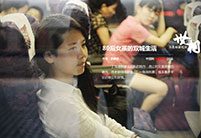 Fan Bingbing's "Queen style" in new play
Fan Bingbing's "Queen style" in new play
 Yanxi Lake: Venue for APEC China 2014
Yanxi Lake: Venue for APEC China 2014
 Top 10 pricey destinations for studying abroad
Top 10 pricey destinations for studying abroad
 Couple chase tornados to create perfect storm photos
Couple chase tornados to create perfect storm photos
 J-10 fighters show aerobatic stunts in smog-free sky
J-10 fighters show aerobatic stunts in smog-free sky
 Top 10 charming female soldiers of the PLA
Top 10 charming female soldiers of the PLA
 Charming contestants of Shanghai Int’l Model Contest
Charming contestants of Shanghai Int’l Model Contest
 Most amazing chi-pao beauties
Most amazing chi-pao beauties
 7 deadly animal attacks
7 deadly animal attacks
 Picturesque autumn scenery of Hongshan Army Horse Ranch
Picturesque autumn scenery of Hongshan Army Horse Ranch
 |
| (Source: CCTV) |
Chinese netizens were outraged after a parent in Zhaoqing City in south China's Guangzhou Province, revealed that her daughter's first grade English text book was full of commercial advertisements.
It is illegal to advertise on school text books that are provided by the government.
Reports on Chinese state media also conformed that English textbooks used by a middle school students in Zhaoqing contained several ads promoting expensive study aids, stationary products etc.
A three-page leaflet promoting various English study guides, dictionaries and even an electronic pen was included in all the textbooks given to students to primary school students from grade one to grade three. In addition to this, the last six pages of the 144-page text books were turned into an advertising supplement peddling other products from the book's publisher.
A teacher at the Zhaoqing middle school explained that individual schools did not have the right to prescribe any textbooks for their students as the local education department made all the decisions on this regard.
A spokesperson for Beijing Ren Ai Educational Research Center, the publisher of these controversial textbooks, said that the advertisements were a form of after-sales service. The spokesperson stressed that all the contents recommended in the "advertising supplement" were education related.
However, many renowned educationalists openly criticized the errant move by the textbooks' publisher.
Xiang Xianming, the Chairman of the Academic Committee of Renmin Univerisity said that advertisements on textbooks given to very young children could mislead them or serve as a coercive marketing ploy, where the parents are pushed to buy the extra audio materials or guidebooks to accompany the textbooks.
Wu Yinghai, a well-known teacher in Jiangsu Province, called for the relevant officers-in-charge to be punished.
Regulations on illegal ads in textbooks
In 2011, China's Education Ministry issued a set of guidelines for the publishers of compulsory educational textbooks. These guidelines stipulate that school textbooks cannot contain any form of advertising.
In 2013, the Education Department of Hubei province purchased more than 3.2 million pirated copies of Chinese dictionaries for the students. These dictionaries contained 20 times more errors than original copies. The relevant officers were reprimanded later.
In September this year, many pirated copies of textbooks were given primary and junior middle school students in Harbin, the capital of northeast China's Heilongjiang Province. Lots of errors were found in these pirated copies, which were sold at a higher price than the original copies.
Earlier this month, a citizen in Changzhou city, east China's jiangsu Province, found that a book titled 'the second grade Mei Yangyang', which was read by her daughter after school every day contained obscene content. However, this book is in the recommended list released by the education authority in jiangsu Province.
 Century-old public bath closes door in Beijing
Century-old public bath closes door in Beijing A post-80s girl's tale of two cities
A post-80s girl's tale of two cities Shocking! Photos of Chinese fighters revealed
Shocking! Photos of Chinese fighters revealed World's most intimidating nuclear weapons
World's most intimidating nuclear weapons Standard faces for each countries
Standard faces for each countries Netizens fall in love with champion swimmer Ning Zetao
Netizens fall in love with champion swimmer Ning Zetao Vibrant 21-year-old and her own Cheongsam brand
Vibrant 21-year-old and her own Cheongsam brand Fashion style: Faye Wong vs Cecilia Cheung
Fashion style: Faye Wong vs Cecilia Cheung Leading director Wang Quan'an detained for 'buying sex'
Leading director Wang Quan'an detained for 'buying sex' Top 10 handsome football players
Top 10 handsome football players  Top 10 Chinese goddesses
Top 10 Chinese goddesses  Top 20 hottest women in the world in 2014
Top 20 hottest women in the world in 2014 Top 10 fifth generation jet fighters in the world
Top 10 fifth generation jet fighters in the world Top 10 pure beauties in showbiz
Top 10 pure beauties in showbiz  Top 10 world's highest-paid models 2014
Top 10 world's highest-paid models 2014 The most gorgeous Chinese women
The most gorgeous Chinese women Top 10 most handsome faces in Asia
Top 10 most handsome faces in AsiaDay|Week|Month